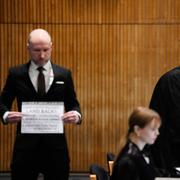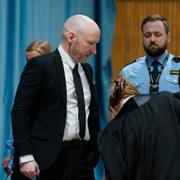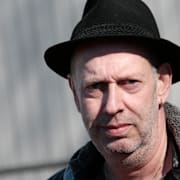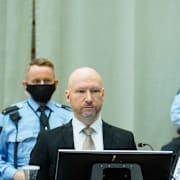
Breivik vill bli frigiven – spred propaganda i rätten
Klockan 10 samlades rätten i Telemark för förhandlingar om terroristen Anders Behring Breivik, som begärt att bli frisläppt.
Norska medier uppger att Breivik, som numera kallar sig Fjotolf Hansen, gjorde Hitlerhälsning och spred nazistisk propaganda när han anlände till rättssalen.
Breivik har precis som alla andra fängelsedömda i Norge rätt till prövning om villkorlig frigivning när tio år av straffet har avtjänats. Norska bedömare ser det som helt osannolikt att hans begäran kommer att hörsammas.
bakgrund
Utøyadådet
Wikipedia (en)
The 2011 Norway attacks, referred to in Norway as 22 July (Norwegian: 22. juli) or as 22/7, were two sequential domestic terrorist
attacks by Anders Behring Breivik against the government, the civilian population, and a Workers' Youth League (AUF) summer camp, in which 77 people were killed.
The first attack was a car bomb explosion in Oslo within Regjeringskvartalet, the executive government quarter of Norway, at 15:25:22 (CEST). The bomb was placed inside a van next to the tower block housing the office of the then Prime Minister Jens Stoltenberg. The explosion killed eight people and injured at least 209 people, twelve severely.The second attack occurred less than two hours later at a summer camp on the island of Utøya in Tyrifjorden, Viken (then Buskerud). The camp was organized by the AUF, the youth division of the ruling Norwegian Labour Party (AP). Breivik, dressed in a homemade police uniform and showing false identification, took a ferry to the island and opened fire at the participants, killing 67 and injuring 32. Among the dead were Stoltenberg's friends, and the stepbrother of Norway's crown princess Mette-Marit.The attack was the deadliest in Norway since World War II. A survey found that one in four Norwegians knew someone affected. The European Union, NATO and several countries expressed their support for Norway and condemned the attacks. The 2012 Gjørv Report concluded that Norway's police could have prevented the bombing and caught Breivik faster at Utøya, and that measures to prevent further attacks and "mitigate adverse effects" should have been implemented.The Norwegian Police arrested Breivik, a 32-year-old Norwegian right-wing extremist, on Utøya island and charged him with both attacks. His trial took place between 16 April and 22 June 2012 in Oslo District Court, where Breivik admitted carrying out the attacks, but denied criminal guilt and claimed the defense of necessity (jus necessitatis). On 24 August, Breivik was convicted as charged and sentenced to 21 years of preventive detention in prison, the maximum sentence allowed in Norway.
Omni är politiskt obundna och oberoende. Vi strävar efter att ge fler perspektiv på nyheterna. Har du frågor eller synpunkter kring vår rapportering? Kontakta redaktionen



